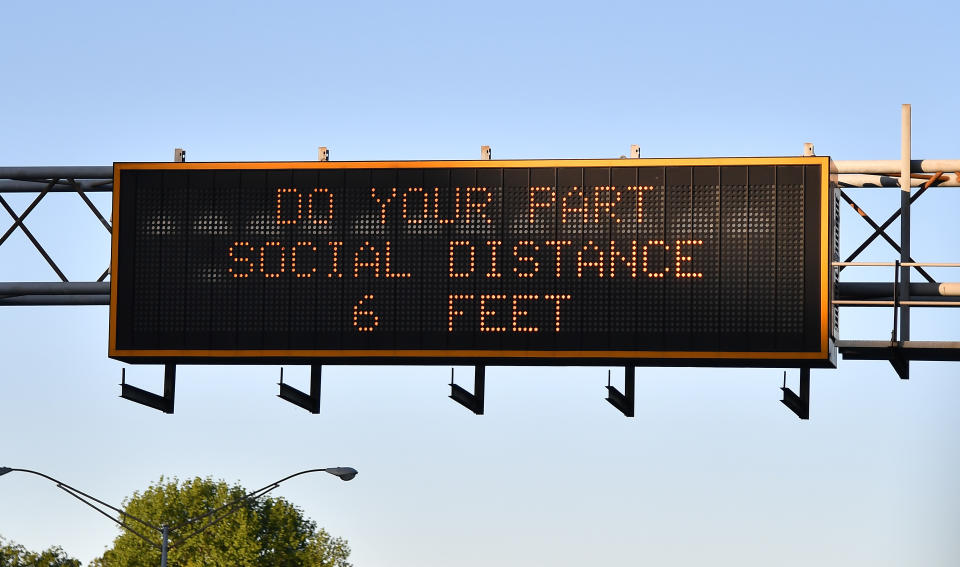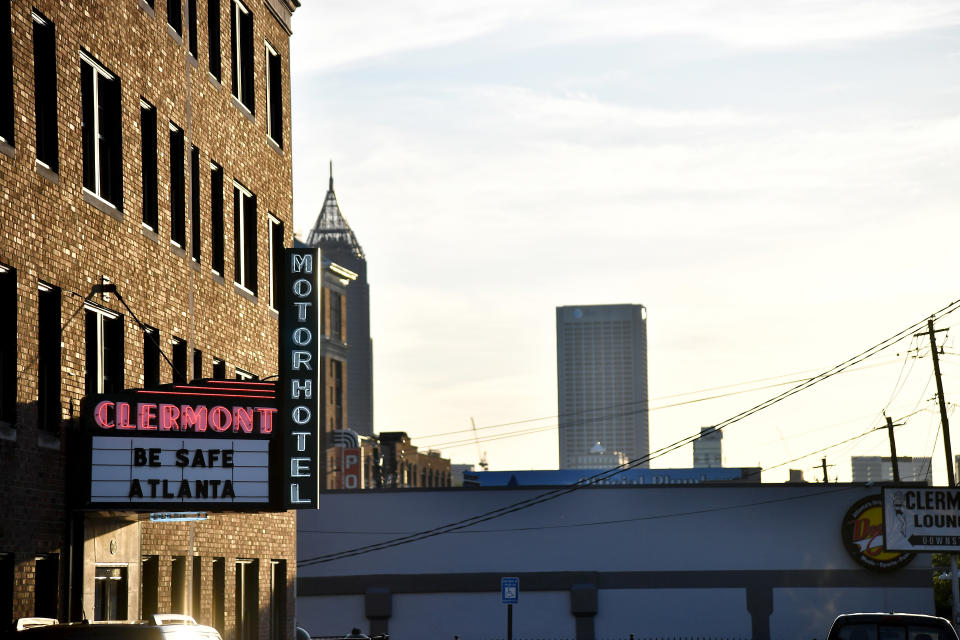Small business owners split on Gov. Kemp’s decision to reopen economy in Georgia amid coronavirus pandemic

Georgia is back open for business this week. On Friday the state will take an extraordinary step in reopening its economy by allowing certain businesses, including barber shops, nail salons, bowling alleys, gyms, tattoo parlors and more, to reopen. Church services can resume Sunday, and on Monday theaters and dine-in restaurants will be allowed to reopen. It’s a decision that has been met with widespread skepticism across the country as public health experts warn the move invites a new wave of coronavirus infections.
On Wednesday, President Trump said he disagreed with Georgia Gov. Brian Kemp’s decision to reopen the economy. “I told the governor of Georgia, Brian Kemp, that I disagree strongly with his decision to open certain facilities which are in violation of the Phase 1 guidelines for the incredible people of Georgia,” Trump said during his daily coronavirus task force briefing. “At the same time, he must do what he thinks is right. But I disagree with him on what he’s doing.”
Still, Kemp believes this is the right decision. In response to Trump’s criticism, Kemp posted to Facebook Wednesday night. “I appreciate his bold leadership and insight during these difficult times and the framework provided by the White House to safely move states forward,” he wrote. “Our next, measured step is driven by data and guided by state public health officials. We will continue with this approach to protect the lives — and livelihoods — of all Georgians.”
Critics of Kemp aren’t convinced. Former Democratic gubernatorial candidate Stacey Abrams called Kemp's decision “dangerously incompetent.” In a tweet, Abrams noted that Georgia has the 14th highest infection rate and seventh-lowest testing rate.
Georgia: 14th highest infection/7th lowest testing rate; less econ resilient & 1000s of low-wage workers already forced to risk their lives to make a living. Weakened healthcare w/closed rural hospitals, no Medicaid expansion & a doctor shortage. Reopen? Dangerously incompetent. https://t.co/FFfk9EoN3l
— Stacey Abrams (@staceyabrams) April 20, 2020
As of Thursday afternoon, there are more than 21,500 confirmed COVID-19 cases in Georgia and more than 870 deaths, according to the Georgia Department. of Public Health. More than 94,000 people also have been tested in a state with a total population of 10 million. By comparison, over this same time period, North Carolina, with a similar population size, has just over 7,600 confirmed cases and more than 250 deaths, according to the North Carolina Department of Health and Human Services.
For many local leaders, these testing numbers in Georgia are unacceptable and must improve. Members of Kemp’s coronavirus task force, including Mayor Keisha Lance Bottoms of Atlanta and Bernice King of Atlanta, have said they didn’t know about the governor’s plans to reopen businesses before he publicly announced them. Bottoms said Monday in a statement that while the governor had the ability to begin reopening businesses, “I will continue to urge Atlanta to stay at home, stay safe and make decisions based on the best interests of their families.”
Sen. Lindsey Graham, R-S.C., also said he thought the move to end the lockdown was premature. “I worry that our friends and neighbors in Georgia are going too fast, too soon,” Graham wrote on Twitter.
I support what South Carolina Governor @henrymcmaster announced yesterday -- a small reopening of our state's economy with a focus on social distancing.
I worry that our friends and neighbors in Georgia are going too fast too soon.— Lindsey Graham (@LindseyGrahamSC) April 21, 2020
The governor’s decision to reopen businesses comes a week before the statewide shelter-at-home order in Georgia expires. It’s a confusing predicament for Georgia residents and business owners, who are split on how they feel about the move to ease lockdown rules.
Peter Togel, the owner of a wedding photography company in Atlanta, says he will not reopen his business, despite Kemp’s order and having a team of 12 photographers and videographers that he employs at any given time. “I want our people to be safe,” Togel told Yahoo News. “How in the world can you do a wedding in an event venue by staying 6 feet apart? Dancing? This is a disaster waiting to happen. I’d rather go bankrupt than risk lives.”
Togel added that he lacks faith in Kemp’s decision-making. “I do not trust [Kemp] at all,” Togel said. “The fact he was not aware that people could spread the virus without symptoms blew my mind.”
Kemp said he first learned about asymptomatic spread on April 1, long after researchers had said it was occurring.

Atlanta restaurant owner Michael Duganier said there is no one who wants to get back to work more than he does. But as someone who employs more than 60 people at his restaurant, Publico Kitchen & Tap, he refuses to compromise the safety of his staff and patrons. “I just don’t think it’s the smartest thing for us [to reopen],” Duganier told Yahoo News. “When there’s no vaccine, and I think Georgia is in the top 11 [states] in deaths, and just how many people are affected. … We just don’t agree to that.”
Duganier said the only way he would consider reopening is if the numbers were near zero. “It’s a new ball game right now until people can feel safe,” he added.
But not everyone sees it this way. Loft 109 Barber Studio owner Hashir Smith plans on opening his shop on Friday because he doesn’t see a real need to wait any longer. “I’ve taken this time off to actually build my immune system up, so I feel comfortable going back to work in that environment,” Smith told Yahoo News. He said he’s been eating healthy foods and taking daily vitamins. Smith acknowledges when he does return to the shop, he will take as much precaution as possible. “I’m going to use protective equipment, of course, like a mask and gloves, and just have one person in at a time,” he said.
Smith added that he didn’t feel pressure to open up, despite having six barbers, including himself, on staff, but he also didn’t feel like waiting has changed anything for him. “I don’t know if things are going to be any more dangerous than they are already,” he said. “We are staying at home in quarantine, but we still have to go out and be around people. We’ve got to go to the grocery store.”

This is a sentiment restaurant owner Justin Amick sees as potentially dangerous for small business owners. As CEO and president of Painted Hospitality, Amick owns two upscale boutique bowling entertainment venues in Atlanta that employ more than 150 people. He said that both of his establishments were used to having a wait of four to five hours on the weekend prepandemic, but he’s not confident in reopening his businesses until it feels safer to do so. “I need to be open to survive just like any other business,” Amick told Yahoo News. “But the battle is not over. It’s not over until there is a vaccine. There needs to be more testing and more data. People need to stay home. I’m perpetuating the problem if I open.”
When it is time to reopen, Amick is considering serious safety options inside his venues, including cashless payment options, distance markers on the floor of his bar, allowing guests to use their own shoes when bowling, sanitizing all bowling balls between customer uses and checking the temperature of patrons and staff before they enter the establishment.
Amick added that economically he’s not sure reopening right now makes sense for small businesses either. If you don’t make enough money to cover operating costs, Amick said, opening back up could make things worse if you can’t apply for grant programs and government assistance. “For many small businesses, the hardest uphill battle is yet to come,” Amick said. “It’s not the closing period; it’s reopening. A rush to reopen could be the final nail in the coffin.”
_____
Click here for the latest coronavirus news and updates. According to experts, people over 60 and those who are immunocompromised continue to be the most at risk. If you have questions, please refer to the CDC’s and WHO’s resource guides.
Read more from Yahoo News:
Public health expert calls for 'no-cost' coronavirus testing and treatment to end racial disparities
How do you celebrate Easter during the coronavirus pandemic? For many, it depends on their pastor
Liberty University students split over decision to reopen school
Telehealth apps for coronavirus approved for Medicare. Here's how they work.



